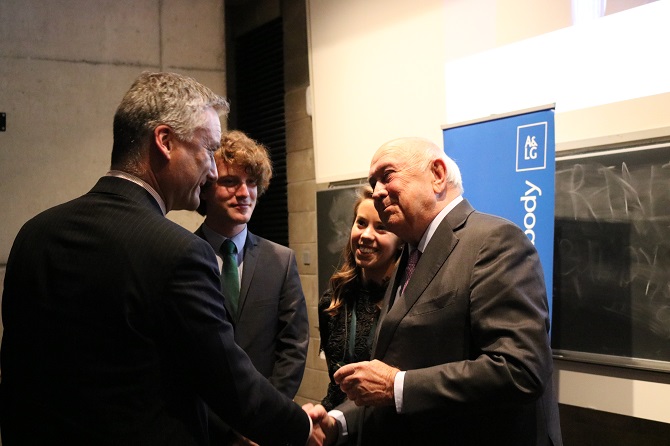
De Klerk began his talk with a recount of the European colonial mindset in the early 20th century, explaining how Europeans believed they had a divine right to rule over other counties. Examples such as the slave trade, Belgium control of the Congo and extermination of the aboriginal population in Tasmania were given as part of a “long and shameful” litany of Western colonisation. Civil liberties were were available to only certain segments of the population as restrictions were placed on people’s race, gender and class.
The practice of colonisation began to recede after World War 2 as European resources were needed in their home countries. Factors such as revulsion at the Nazi war crimes and American influence also played a role in decolonisation. De Klerk noted that the artificial borders left by the British encompassed “10 or 11 different languages”. The country was also left with a white monopoly on power.
The government of South Africa was under international pressure to change its segregation laws from the 1960’s onwards. The issues that concerned the lawmakers included the communist influence in the African National Congress and the manner in which other African states that had granted “one man, one vote” policies had descended into chaos. When Mr De Klerk was in government in the 1980s they tried to reform the system by repealing “hundreds of apartheid laws” but this proved too small a measure.
De Klerk spoke of the adoption of the new constitution that had equality enshrined as a founding principle, elaborating on the difficulties of finding a balance between freedom and equality. In South Africa, all jobs and land were aimed to be distributed fairly along racial demographics but this in turn limited freedom. De Klerk finished his speech speaking of the hope that South Africa would move away from “racially-based politics and move on to value-based politics”.
The question and answer session that followed the talk proved to be much more interesting than the talk itself as De Klerk fielded a number of the difficult questions from the audience. The tone was set early on as the first question concentrated on the “hundreds of apartheid laws” that De Klerk had mentioned in his speech. The question asked whether De Klerk had any role in their implementation in the first place. He acknowledged that he had but the idea he had supported was not racial discrimination but of “dividing South Africa into 9 or 10 independent states in a union”. This plan was found to be infeasible.
De Klerk was also asked whether the controversial current president of South Africa, Jacob Zuma, was carrying on his legacy, to which he replied: “the short answer is no”. He mentioned the myriad of corruption scandals alleged against Zuma. In response to another question, Mr De Klerk mentioned the ending of the nuclear programme in South Africa as one of the highlights of his presidency.
The last question proved to be one of the most contentious of the evening. It was asked, with the knowledge that the Nobel committee often awards the Peace Prize as a shared award to both sides of a conflict, whether the fact he was won the award with Nelson Mandela was “just politeness”. De Klerk noted that the decision may not have been just to acknowledge him personally but the whole South African government for compromising. He also said it was a “courageous decision” by the Nobel committee as he, unlike Nelson Mandela, was the unpopular candidate. These remarks wrapped up what proved been a thoroughly entertaining evening provided by Law Soc.






